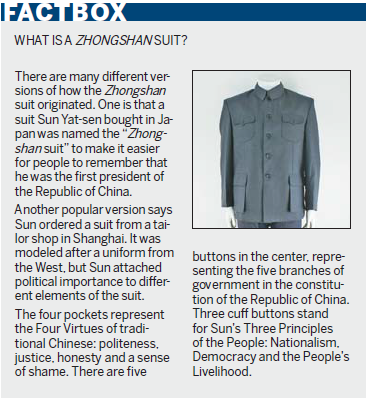
![China's President Xi Jinping (C) gives a speech during a state banquet at the Royal Palace in Amsterdam March 22, 2014. [Photo/Agencies] China's President Xi Jinping (C) gives a speech during a state banquet at the Royal Palace in Amsterdam March 22, 2014. [Photo/Agencies]](U363P886T1D106186F12DT20140324093233.jpg)
China's President Xi Jinping (C) gives a speech during a state banquet at the Royal Palace in Amsterdam March 22, 2014. [Photo/Agencies]
President's attire shows pride in Chinese culture
President Xi Jinping appeared at Saturday's state banquet hosted by the Dutch royal family in a formal traditional Chinese suit, which experts say displayed the leader's national pride and confidence in Chinese culture. [Special coverage]
The eye-catching dark blue suit, slim-cut with a standing collar, is a simplified and redesigned "Zhongshan suit", or "Mao suit" - a typical formal garment for Chinese men.
Zhou Jiali, a diplomatic protocol expert from China Foreign Affairs University, said Xi's attire not only meets international diplomatic norms, but also manifests China's ethnic style.
"President Xi's outfit at the banquet is not strictly a Zhongshan suit, which normally has four pockets. Instead, it is a type of modified Chinese standing-collar outfit," Zhou said in an interview with a Chinese newspaper.
"The entire design goes with Chinese style, but some subtleties are tinged with a modern tailoring spirit. For example, a Western-style pocket square was designed at the left chest," she said.
Lu Peixin, former acting head of the Protocol Department of the Foreign Ministry, said the decorative color of Xi's suit pockets matched the embroidery color of first lady Peng Liyuan's traditional overcoat.
"In addition to exhibiting the beauty of Chinese culture, the outfits of Xi and Peng also create a harmonious and vivid impression of a 'lovers pack'," Lu said.

In the fashion world, the traditional qipao dress portrays a Chinese woman's beauty, and Zhongshan suits represent a man's status.
"Foreigners will interpret the Zhongshan suit as a political symbol because it has typical Chinese connotations," said associate professor He Yang at the Beijing Institute of Fashion Technology.
"It came out during a period when Western culture entered China in 1920. The Mao suit was a fusion of fashion and culture. It had an outline of a Western suit, but it had Chinese elements," said Liu Yuanfeng, dean of BIFT.
The blue and gray suit was the only choice for Chinese men. It dominated local menswear from 1920 to 1980. That was why many people in the Western world thought China was a "gray society", because nearly all the men wore gray Zhongshan suits.
Chairman Mao Zedong popularized it, so the garment became known in the West as the "Mao suit".
After the reform and opening-up in 1978, Chinese people had more choices in clothing, and Western suits became popular. With foreign fashion brands coming into the Chinese market, fewer and fewer local people were interested in the Mao suit and its connotations.
Even so, there are some older people who still own one or two Mao suits. Chinese leaders, including Deng Xiaoping and Jiang Zemin, continued to wear them on important occasions, such as the nation's anniversary celebrations.
BIFT's Liu has seen a revival of the Mao suit over the past few years. He said there are many young designers and local fashion companies that want to popularize it again.
When then president Hu Jintao inspected the country's defense forces in celebration of the 60th anniversary of the founding of the People's Republic of China in 2009, he was wearing a gray Mao suit in Tian'anmen Square.
The suit he wore has all the characteristic elements of a traditional Mao suit, but was designed in a Western style. It was slim cut in a three-dimensional way - a modern technique in fashion.
"It was a redesigned one. Modern Mao suits will become very popular during business occasions, as it looks formal and represents China," said Xia Hua, chairwoman of Eve Enterprise Group, which was in charge of making Chinese leaders' clothes for the ceremony.
Xi, Peng dazzle in classic Chinese garments
2014-03-24Copyright ©1999-2018
Chinanews.com. All rights reserved.
Reproduction in whole or in part without permission is prohibited.